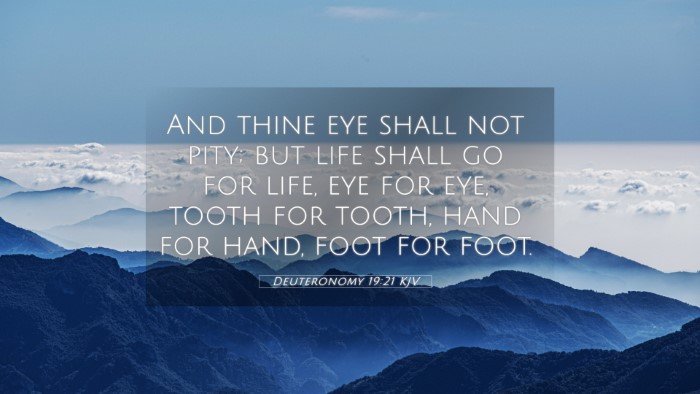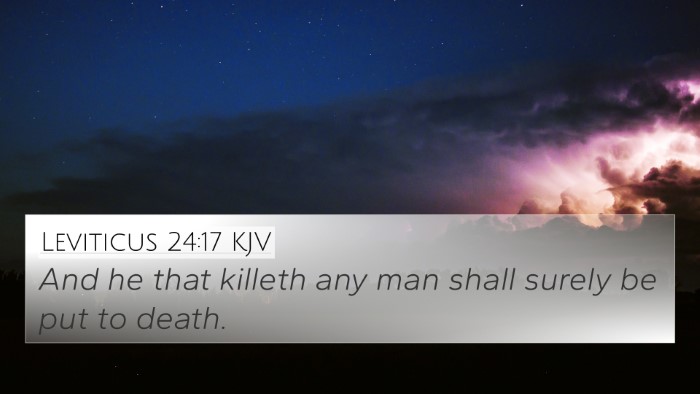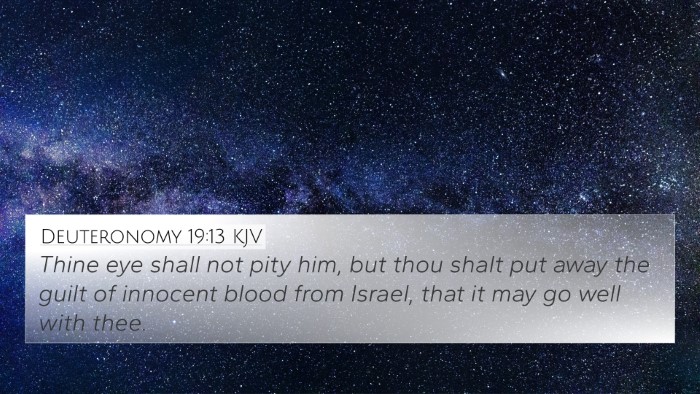Understanding Deuteronomy 19:21
Deuteronomy 19:21 (KJV): "And thine eye shall not pity; but life shall go for life, eye for eye, tooth for tooth, hand for hand, foot for foot."
Summary of Biblical Meaning
This verse presents a principle of justice known as "lex talionis" or the law of retaliation, which emphasizes the concept of equitable punishment corresponding to the offense. The legal context in which this command is situated reflects God's intention to establish a society grounded in fairness and accountability.
Commentary Insights
-
Matthew Henry:
Henry highlights that this law serves to restrain excessive punishment and curb vengeance. It ensures justice is executed without malice, urging judges and individuals to maintain impartiality and not allow personal feelings to influence their decisions.
-
Albert Barnes:
Barnes emphasizes that this directive cannot be applied literally in every circumstance; instead, it symbolizes a more profound principle of balance and justice in situations of wrongdoing. He notes that such a rule prevented arbitrary punishment and established a framework for fair restitution.
-
Adam Clarke:
Clarke discusses how the maxim "an eye for an eye" aims to limit revenge, thereby protecting individuals from personal biases. He reminds readers that while justice must be served, it is paramount to have compassion and uphold moral virtues throughout the judicial process.
Bible Verse Cross-References
Deuteronomy 19:21 finds connections with numerous verses throughout the Scripture that elaborate on justice and punishment, including:
- Exodus 21:24: "Eye for eye, tooth for tooth, hand for hand, foot for foot."
- Leviticus 24:20: "Breach for breach, eye for eye, tooth for tooth: as he hath caused a blemish in a man, so shall it be done to him again."
- Matthew 5:38-39: "Ye have heard that it hath been said, An eye for an eye, and a tooth for a tooth: But I say unto you, That ye resist not evil."
- Romans 12:19: "Dearly beloved, avenge not yourselves, but rather give place unto wrath: for it is written, Vengeance is mine; I will repay, saith the Lord."
- Genesis 9:6: "Whoso sheddeth man's blood, by man shall his blood be shed: for in the image of God made he man."
- Psalm 94:1: "O Lord God, to whom vengeance belongeth; O God, to whom vengeance belongeth, shew thyself."
- Proverbs 24:29: "Say not, I will do so to him as he hath done to me: I will render to the man according to his work."
- James 2:13: "For he shall have judgment without mercy, that hath shewed no mercy; and mercy rejoiceth against judgment."
- Galatians 6:7: "Be not deceived; God is not mocked: for whatsoever a man soweth, that shall he also reap."
- 1 Peter 3:9: "Not rendering evil for evil, or railing for railing: but contrariwise blessing; knowing that ye are thereunto called, that ye should inherit a blessing."
Thematic Connections
In examining the overarching themes connected with Deuteronomy 19:21, we observe its foundational influence on the Biblical legal system and ethical teachings that transcend time. The emphasis on equal justice serves as a guiding principle for contemporary judicial practices and moral reasoning.
Tools for Bible Cross-Referencing
To further study the interrelations of Biblical texts and explore the implications of Deuteronomy 19:21, consider utilizing various tools:
- Bible concordance
- Bible cross-reference guide
- Cross-reference Bible study
- How to use Bible cross-references
- Bible reference resources
- Comprehensive Bible cross-reference materials
Conclusion
The study of Deuteronomy 19:21 reveals deep insights into the nature of justice within the Biblical context, linking it to broader theological concepts. By investigating related verses and employing effective cross-referencing methods, one can enhance their understanding of Scripture and the principles guiding ethical behavior.






